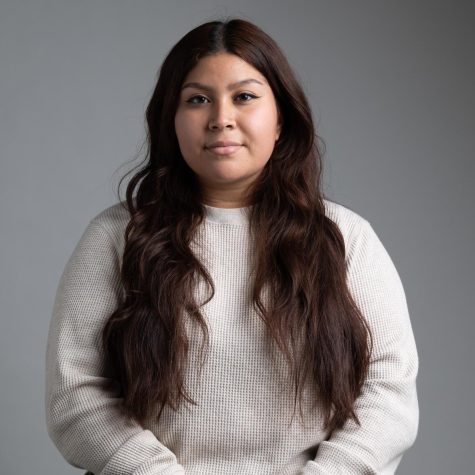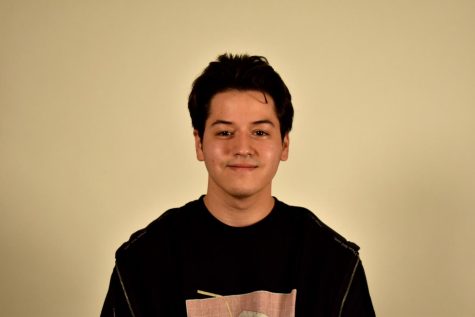

Tenderloin Linkage Center has made progress but open air drug use has backlash
Feb 9, 2022
Daniel Miller sits around the corner of the homeless encampments on Feb. 7 (Esteban Renteria / Golden Gate Xpress)
The San Francisco Board of Supervisors debated on Tuesday over the Tenderloin Linkage Center that provides services for unhoused people and people with drug addiction.
A major point made in the discussion was if the Tenderloin Linkage Center should be contracted with treatment providers that are abstinence-based or harm reduction. Abstinence-based treatment would make the person be completely drug free.
Mayor London Breed declared a local emergency due to the increase of drug overdose deaths in the Tenderloin district on Dec. 17, 2021. San Francisco signed a lease for the center as a part of the initiative. The Tenderloin Linkage Center is run by the Department of Emergency Management.
Described as a “multi-phase” project by Mary Ellen Carroll, executive director of DEM, the Linkage Center helps improve the Tenderloin by providing services such as shelter, food, showers, behavioral health and medical care for unhoused people and people with drug addiction.
Dr. Hillary Kunins, director of Behavioral Health Services from the Department of Public Health, explained that the contracted treatment providers are aiming to help people stop their substance use but also said that they aren’t specifically abstinence-based or harm reduction.
District 11 and District 2 Supervisors Asha Safaí and Supervisor Catherine Stefani said that they want there to be more options that are sober living. There was a back-and-forth debate between Dr. Kunins and Supervisor Safaí about the definition of sober living.
“There are people that have substance abuse disorder that absolutely cannot use their drug of choice… because they could die and don’t want to,” Supervisor Stefani said. Stefani said they want a place that focuses on abstinence based recovery for the suffering addicts that need it.
The Tenderloin Linkage Center is run by the Department of Emergency Management. Executive Director Mary Ellen Carroll presented the progress the center has made over the last few weeks.
Phase one of the project was about engagement and assessment, where the Center worked with community and city stakeholders to set short and long term solutions. The current phase is crisis operations, where they are connecting visitors to services as well as stepping in on street vending. Phase three will be restoration and recovery. [2]
The Linkage Center has regular meetings with Tenderloin residents, merchants and community-based organizations to get feedback.
Emily Cohen, deputy director for the Department of Homelessness and Supportive Housing, shared in the presentation what the department has brought to the initiative.
“We have made approximately 150 shelter placements, both from the street and out of the Linkage Center into a variety of shelter resources that we currently have available,” Cohen said.
As of now, the Center has placed 117 people in shelters, connected 893 people to treatment, cleaned 922 tons of waste and seized 5,975 grams of fentanyl.
“These are the long term programs and investments that will sustain a thriving neighborhood,” Carroll said.
Another goal of the initiative is to reduce illegal drug dealing. San Francisco Police Chief William Scott works with the center and said that in November 2021, there were 19 narcotic sale and possession arrests and one citation which resulted in 20 total arrests.
In December 2021 the numbers increased to 42 narcotic sale and possession arrests and three citations which resulted in 45 total arrests.
District 10 Supervisor Shamann Walton voiced concern about other districts that continue to experience homelessness and drug use. Services and resources have moved from other districts to the Tenderloin. Supervisor Asha Safaí held the same concern as Walton.
“Certainly I don’t want to have my district or other parts of San Francisco suffer as a result of increased requirements and presents in the Tenderloin,” Safaí said.
Public comments were heard after the two hour long debate. There were over a dozen callers, lasting nearly an hour. Many of the concerns that came up were about how the Linkage Center partners with sites that are for harm reduction instead of being abstinence-based.
“Centuries of a puritanical view of substance abuse, decades on the war on drugs have led us to believe that abstinence is the only way,” Nikos Pecoraro, health systems navigator at GLIDE Harm Reduction, said. “Abstinence is a part of harm reduction and it works really well for some people, and harm reduction, very often, leads people to abstinence.”
The board voted unanimously to move the public hearing as well as their vote on the proclamation to March 15. That will give the center five weeks until the next check-in to continue giving progress updates.

